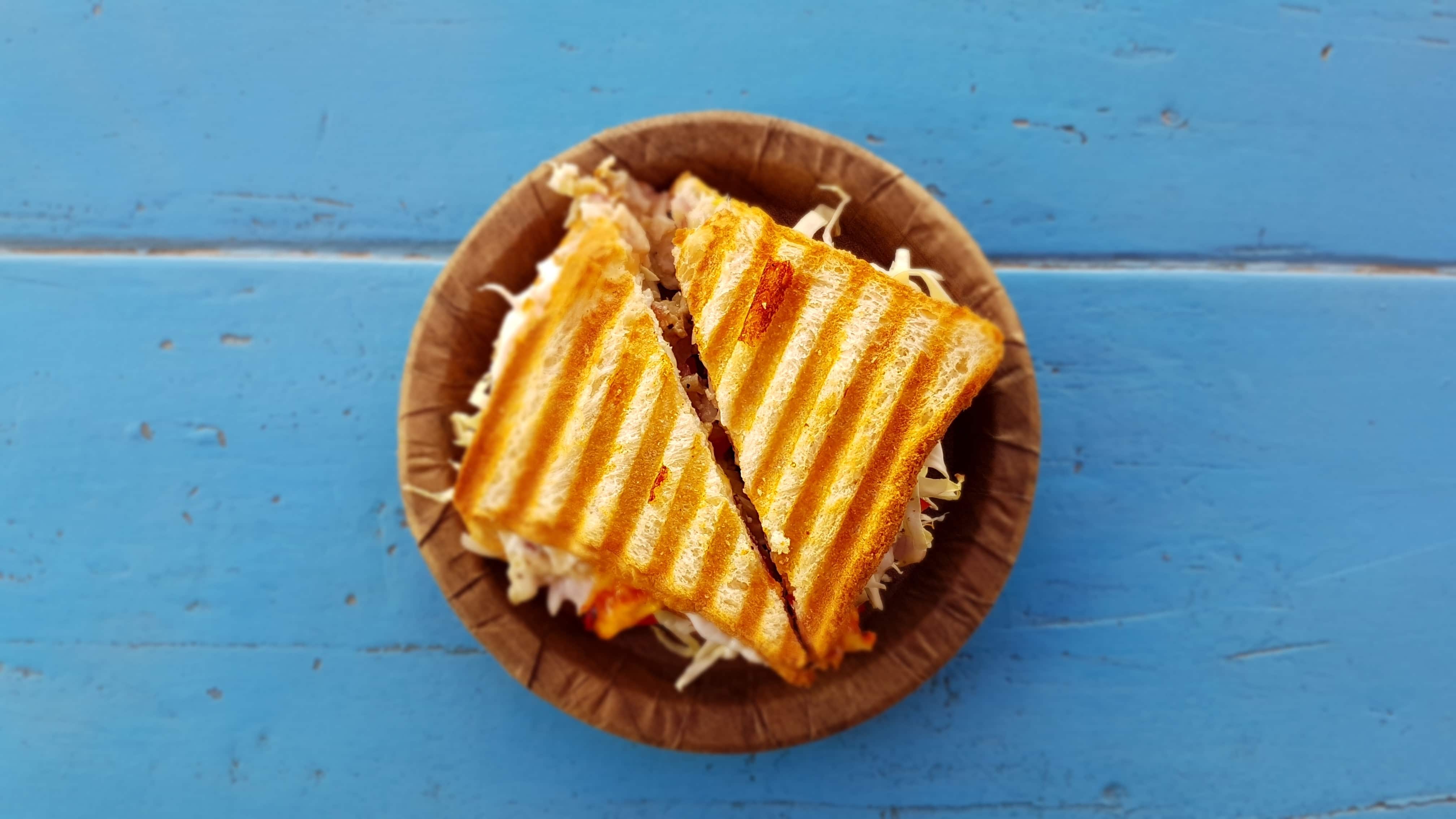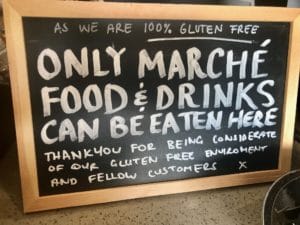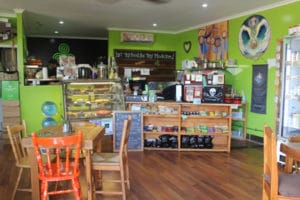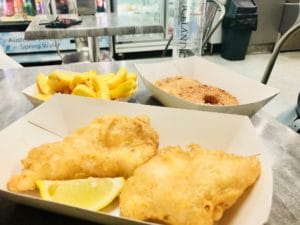
It has become clear in recent months that the use of the label ‘gluten free’ has been used a little too liberally in some sectors of the food industry. Recent reports have discovered that some packaged products labeled gluten free, as well as meals/items identified as gluten free through signage or on listed menus, have in fact had react-able amounts of gluten present. This is obviously very concerning for the 1 in 70 Australians diagnosed with coeliac disease who must adhere strictly to a gluten free diet. It is also in violation of Australian food labelling laws that require ‘nil gluten detected’ for a food to be labelled “gluten free”.
It appears that, in both contexts, cross contamination and staff ignorance are the two biggest barriers to coeliacs eating ‘safely’ and avoiding being glutened, by causing them to ‘accidentally’ or unexpectedly consume gluten.

Cross Contamination
What is it? It is when gluten free foods (by ingredient) come in contact with gluten in the food storage, preparation or plating stages, and are therefore is no longer considered gluten free (particularly for a coeliac).
Common food handling issues causing cross contamination include:
- prepping gluten free food on the same bench as other items, without cleaning it first
- cooking gluten free items in fryers or boiling water that also contained gluten items
- using the same utensils in a communal jar of spreads or sauces, allowing gluten crumbs to be deposited
- using the same utensils to serve both gluten and gluten free foods
- not freshly cleaning a grill or tray prior to using it for gluten free items
- not having a seperate toaster for gluten free breads
- storing uncovered gluten free items (eg. cakes) next to or underneath an open shelf containing uncovered gluten items
Cross contamination is arguably the biggest inhibitor preventing coeliacs from experiencing a stress free dining experience. Well that and the actual difficulty of finding gluten free items on a menu in the first place of course. But if you do happen to find a lot of little GFs on a menu, it is clear that we can’t then relax, we can’t happy dance and breathe a sigh of relief, because it increasingly seems that “gluten free” means diddley squat in the menu world.
Scarily it doesn’t actually even mean at times that there are no gluten ingredients in the actual food (even though food licensing laws mean it should), which leads to the second issue…staff ignorance.
Staff Ignorance
Staff ignorance is an issue when wait staff, food prep staff, or even at times the chefs, clearly do not actually know what foods contain gluten and what do not. Common mistakes here include the use of wheat flour to dust foods prior to cooking, thinking spelt flour is gluten free, using soy sauce containing gluten or malt-based vinegars, using gluten-containing mayonnaise, batters made with beer.
It can also occur through staff simply ‘forgetting’ that the meal was meant to be gluten free, and then communication breakdown between the kitchen and the front of house wait staff causes some unsuspecting coeliac to be served food containing gluten.
This happened to me once at a cafe where I ordered a toasted sandwich on gluten free bread. The waitress I assume gave a gluten free order to the kitchen, but the sandwich came out on wheaten bread. When I saw it I thought it didn’t look like gluten free bread, so I checked with the waitress who assured me it was gluten free. So I ate it, the whole time thinking ‘this is AMAZING’ for a gluten free sandwich! Well lesson learnt…if it looks and tastes non gluten free, it probably is! I was sick for a week after that. I assume the waitress ordered gluten free, but the kitchen staff forgot and the waitress just assumed it was when she served it to me.
So, sadly we cannot assume that ‘gluten free’ signage or reassurance from wait staff actually means your food is going to be gluten free.
This is scarily exemplified by this story one woman recently shared on social media of her experience as a coeliac trying to eat out gluten free.
Case Study:
I go to a café today…and I was pretty hungry…
Anyhoo…I order a cuppa and ask what gluten free options they have.

They point to the top row of the cabinet where it has a little sign saying ‘Gluten Free’…so I order a “GF passionfruit slice”…sounds yummy right? I thought so…In fact I was kind of looking forward to it…till the woman who served me says “How much weight have you lost on the gluten free diet?”
I’m like…”I’m coeliac. I don’t eat gluten free because I want to lose weight, I eat it because I have to. Gluten can make me sick…”
Then she is like “Don’t eat that slice…I’ll give you a refund”
I’m like “Why?”
And she is like “Because most of the ingredients are gluten free but we put Kelloggs Rice Krispies in the base to make the bases go further…and that box says contains gluten cereals…”
I’m like “You can’t advertise something as GF when it isn’t…you’ll make someone really, really unwell…”
She is like “Well they are mostly gluten free”
I’m like “A trace can make people sick”
Her solution? To go and write in marker, besides the label saying gluten free options, “for non coeliacs”
Are you kidding me?
The mind actually boggles.
Shared Fryers

Another example of a ‘glutening’ waiting to happen is the issue of shared fryers for gluten free items. Crazily there are chefs out there that believe that if their oil is set at a high enough temperature, the gluten will get ‘burnt off’ or ‘killed’ and the food cooked in it will therefore be OK for coeliacs.
I encountered this myself in a local Brisbane restaurant just 6 months ago. I was dumbfounded. Quite simply if the oil was actually hot enough to ‘burn off’ the gluten, the food remaining would be mostly charcoal. The gluten is of course simply having its molecular changed so dramatically that it becomes another substance…charcoal. You can read more of this particular experience & of the science behind why this is so so wrong in my other BLOG Gluten CANNOT Be Burnt off in Hot Oil!!, but suffice to say, do not, ever, eat anything in a restaurant or café where this level of food science ignorance is displayed. They obviously have no clue. And always ask if the fried items are cooked in a dedicated separate fryer for all gluten free items.
What to Do?
These stories highlight the pickle we are in, and the seriousness of the ignorance that exists & the cross contamination issues we face. They are also a reminder that we have to be vigilant at all times. We have to become little coeliac cross contamination awareness evangelists…asking many many questions until we are satisfied the staff are informed and you feel confident they will handle your food coeliac safely. We also have to point out when cafes and restaurants get it so so wrong, so that some other unsuspecting coeliac that comes along doesn’t foolishly actually take their word for it and believes that the food they are ordering is gluten free.
Unfortunately for us though this is often exhausting as it adds to emotional stress of eating out as a coeliac.
So what is the solution? Well…there really isn’t one (other than the vaccine that hopefully one day will eventually enable us to eat gluten again!). We just have to keep educating the food industry of coeliac safe food handling practices (download my FREE Coeliac Safe Food Handling doc below), and spread the love to the establishments that do take gluten seriously.
Here are some concrete ways you can help with this process:
- Alert your local Coeliac Society of any venues that have caused you to be glutened or use food preparation practices that will cause cross contamination (the info helps them orientate their future awareness campaigns)
- Speak up…be brave and say something when you notice that cross contamination is occurring. And if you feel really brave, and choose your words wisely, gift them with the FREE Food Handling doc to help educate them on how they can improve 🙂
- Vote with your feet and give your patronage to the food venues that do look after coeliacs well. Also…spread the word on social media so that more coeliacs can find these great venues.
With respect to packaged products, industry standards are meant to hold manufacturers accountable for false labelling claims, so we can but hope that there will be an appropriate response from authorities to correct this situation in that sector.
Until then, stay vigilant, and hopefully, one voice at a time we will start to make a big difference.
I would love to hear in the COMMENTS below of any experiences you have had where you were either glutened while eating out due to cross contamination/staff ignorance issues, or your questioning of wait staff thankfully saved you from that fate!
Coeliac Safe Food Handling Practices
I have put together a FREE Downloadable PDF outlining the Coeliac Safe Food Handling Practices all food professionals should be aware of. Simply click the link to grab your copy to use as your own reference or to print out & hand out to foodie establishments you know are getting it very wrong.

